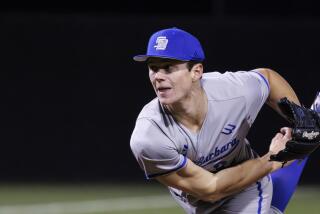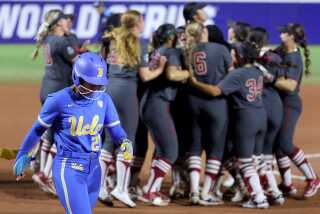COLLEGE WORLD SERIOUS
- Share via
Hundreds of thousands of words have been written about the men he helped prepare for the major leagues--Eric Karros, Todd Zeile, Don Slaught, Jeff Conine, Bob Hamelin, Matt Young, Tim Leary and Shane Mack among them.
Yet his public profile is about as low as it gets in this neighborhood--near-subterranean for someone who has spent almost a quarter-century coaching a major sport at UCLA.
Gary Adams has a theory on this.
“I’m not sure I’ve ever done anything to warrant a story to be done about me,” says Adams, days before his Bruins embark on their seventh trip to the NCAA regionals in the last dozen years. “That’s probably the biggest reason.
“I’m serious. I just feel like [long pause] I could have done so much better. We’ve had good players here. Every year I feel like we can win the national championship.”
And yet. . . .
“UCLA is probably most famous for being one of the best teams ever that has never gone to the College World Series,” Adams says, supplying his own punch line.
“I think we’ve also been the team that’s come as close to the World Series without getting there. We’ve lost five times in the final game [of the regionals].
“I don’t know if I’m bragging or complaining here. Maybe both.”
Adams launches into this sort of self-flagellation easily and unprompted. He is the winningest baseball coach in UCLA history, having broken Art Reichle’s previous standard of 747 victories earlier this season, and has sent more players to the majors--28--than any active college coach, yet he is hounded by the O-fers.
O for 23.
O for 5.
Twenty-three years and five appearances in the regional finals with UCLA without once bursting, squeaking, stumbling or lucking his way into the College World Series.
“They all gnaw at you,” Adams, 57, says of the near-misses. “You never forget that final game. Because you see the other team jumping up and down, celebrating, and you feel so bad for our players, who worked just as hard as the other team. And there’s nothing you can say to cheer them up.
“Believe me, no one’s had more experience at trying to than I have.”
Today in Stillwater, Okla., Adams tries again. His Bruins, ranked fourth in the nation by Baseball America, are 40-18-1 and seeded first in the Midwest Regional, where they will open the playoffs against lightly regarded Harvard.
In other words, Adams is set up again--for either an angst-ending breakthrough, finally, or one more wrenching disappointment.
Ironically, Adams was hired by UCLA to replace Reichle in 1975 because of his reputation for being able to win the big one. In his last two seasons at UC Irvine, 1973 and 1974, Adams won NCAA Division II championships.
“I’ll be honest,” Adams says. “Winning the national championship has been more my goal in recent years than earlier because I won two national championships at Irvine and I knew, personally, that I could do it.
“My goals at UCLA have been to graduate my players--that’s No. 1--and No. 2 was to teach them a way how they could become major league players. . . . Now, in more recent years, we’ve added a third goal--’Let’s do those two things, but also try to win the national championship.’
“We have been trying to do all those three things each and every year. And we’ve done a great job getting our guys their degrees. And we’ve done a great job getting them big contracts. And we’ve done a lousy job at winning national championships.”
Worse yet, smaller schools within fungo distance of UCLA have won them. Pepperdine won the College World Series in 1992. Cal State Fullerton won in 1979, 1984 and 1995. Long Beach State has made the trip to Omaha’s Rosenblatt Stadium, where college baseball’s final eight congregate every June, several times.
Adams has been to Rosenblatt once, as a spectator, and says, “I wanted to get out of there as soon as I could. Stanford was in it, and I was eating my heart out. It was no fun.
“I vowed I would never go back unless I was in uniform. A UCLA uniform.”
To date, Adams’ closest brush with national celebrity--or notoriety--came nearly a year ago, when he made headlines for admitting he ordered one of his pitchers, Pete Zamora, to throw at an Arizona State batter and then penalized himself with a self-imposed four-game suspension.
The order came down after Arizona State pitcher Ryan Bradley hit UCLA’s Troy Glaus and “nearly killed him,” in Adams’ words. The self-suspension was imposed after the Pacific 10 Conference suspended Zamora for four games, Adams claiming that he ought to be suspended the same number of games as his pitcher.
The Pac-10 concurred, and threw in an extra two-game suspension for good measure.
“It’s too dangerous for guys to be throwing at people,” Adams says. “That’s why I did what I did last year. Some people didn’t understand--I was fighting fire with fire.”
Adams says his hope was to spur a change in the NCAA rules pertaining to intentionally hit batsmen. Current rules penalize only the pitcher. Adams believes the coach who ordered the pitch should be penalized as well.
“As it turned out,” he says, “it didn’t have a happy ending, in my opinion, because nothing changed. The pitcher is still the one getting penalized and the manager who orders it still gets to coach.”
Adams proudly points out that UCLA is “the only program in California where the catcher calls all the pitches”--except for that one against Arizona State in 1996. That notion brings forth a laugh from the coach.
“The only pitch I called last year,” he says, “and look what it got me.”
The catcher calls the pitches at UCLA because the Bruin baseball program, as Adams has fashioned it, is a major league prep school.
“I think if you’re going to play the major league way,” Adams says, “you’ve got to teach your catchers how to call a game and teach your pitchers to relate with the catcher, not the coach over in the dugout. He’s not going to take me or our pitching coach to the minor leagues with him.
“He’s going to take his own brains. He has to learn how to think for himself, to battle for himself.”
As evidenced by the two former Bruins currently starting in the infield for the Dodgers, the system works. It works, in the unanimous opinion of Karros and Zeile, because of Adams.
“He’s very sportsmanlike, a classy guy, just a great guy to play for,” Zeile says. “What you see is what you get. I think that’s why you see us produce more [big league] players than any college.”
Karros: “He was an easy guy to play for, one of nicest guys you’ll ever want to meet. There was no B.S. at all.”
What’s that baseball adage--Nice guys never get out of the Midwest Regional? After 23 years, Adams is aiming to rewrite that verse, primarily, he jokes, “to get my mom off my back.”
And if he doesn’t?
“Hey, if we hadn’t been graduating players and sending guys to the big leagues, I would have retired a long time ago,” Adams says. “But because I’ve had success in those areas, I can look at myself in the mirror and say, ‘Well, like the song, two out of three ain’t bad.’ ”
College Baseball Notes
Florida State outfielder J.D. Drew was selected national player of the year by Collegiate Baseball magazine. He batted .472 with 28 homers and 94 RBI in 61 games. He also stole 30 bases and has a chance to become the first NCAA Division I player to record a 30-30 if he hits two home runs in the NCAA tournament. Only two players in college baseball history--Frank Fizzini and Pete Incaviglia--have hit 30 homers and stolen more than 10 bases.
Times staff writer Bob Nightengale contributed to this story.
(BEGIN TEXT OF INFOBOX / INFOGRAPHIC)
NCAA Baseball Tournament
Division I regionals beginning today. All times Pacific.
WEST
At Stanford
Texas A&M; (39-20) vs. Fresno State (37-26), 11 a.m.; Cal State Fullerton (38-22-1) vs. Santa Clara (39-18), 3 p.m.; Northeastern (33-17) at Stanford (39-18), 7 p.m.
MIDWEST
At Stillwater, Okla.
UCLA (40-18-1) vs. Harvard (32-14), 9 a.m.; Tennessee (41-17) vs. Ohio (43-16), 1 p.m.; Stetson (37-24-1) at Oklahoma State (43-17), 5 p.m.
SOUTH I
At Baton Rouge, La.
Oklahoma (39-18) vs. Long Beach State (37-24), 9 a.m.; South Alabama (40-17) vs. Houston (40-21), 1 p.m.; North Carolina Greensboro (44-15) at Louisiana State (48-12), 5:30 p.m.
SOUTH II
At Tuscaloosa, Ala.
North Carolina State (41-18) vs. Wichita State (51-16). 9 a.m.; USC (39-18) vs. Virginia Tech (33-26), 1 p.m.; Troy State (36-22) at Alabama (48-12), 5 p.m.
ATLANTIC
At Miami
Arizona State (36-20) vs. Florida International (42-19), 9 a.m.; Florida (38-22) vs. St. John’s (35-15), 12:45 p.m.; Richmond (33-24) at Miami (44-15), 4:30 p.m.
MIDEAST
At Starkville, Miss.
Georgia Tech (44-13) vs. Tennessee Tech (38-21), 10 a.m.; Southwestern Louisiana (43-16) vs. Washington (43-18), 2 p.m.; Ohio State (42-16) at Mississippi State (41-18), 6 p.m.
CENTRAL
At Lubbock, Texas
Clemson (40-21) vs. Nevada (38-19), 9 a.m.; Rice (43-14) vs. Southwest Missouri State (33-23), 1 p.m.; Southwest Texas State (36-24) at Texas Tech (46-12), 5 p.m.
EAST
At Tallahassee, Fla.
Central Florida (40-22) vs. South Florida (37-22), 8 a.m.; Auburn (45-14) vs. Western Carolina (41-18), noon; Marist (32-17) at Florida State (46-15), 4 p.m.
Note--Regional winners qualify for College World Series, May 30-June 7, Omaha.
More to Read
Go beyond the scoreboard
Get the latest on L.A.'s teams in the daily Sports Report newsletter.
You may occasionally receive promotional content from the Los Angeles Times.






